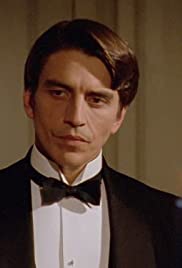
THE CHOCOLATE BOX
UK, 1993, 50 minutes, Colour.
David Suchet, Philip Jackson, Rosalie Crutchley, Anna Chancellor, David de Keyser.
Directed by Ken Grieve.
This is an Agatha Christie short story. It came early in the series of 70 television films with David Suchet as Poirot. It offers the opportunity to know something about Poirot before he came to England.
The opening setting is Belgium the outbreak of World War I, a politician and the accidental death of his wife, his firm stances against the Catholic Church, political unity in Belgium. He is later found dead, eating Belgian chocolates, considered a stroke or suicide.
The young Poirot is a police Inspector, dissatisfied with the verdict of suicide, responding to the appeal of the politician’s wife’s cousin, played by Anna Chancellor early in her career. Poirot investigates, with various suspects, finally the revelation that the politician’s mother had, in a sense, executed her son, for political and cultural reasons. She is played by Rosalie Crutchley towards the end of her career.
The occasion is Inspector Japp being honoured by the Belgian government, his travelling to Brussels with Poirot, returning home for the first time.
1. The popularity of Agatha Christie? The mysteries? The series with David Suchet as Poirot
2. The screenplay based on a short story? Brief, effective? The solving of a mystery in the past?
3. The Belgian settings, the city of Brussels, railway station, hotels, classic buildings? Homes and apartments? Restaurants? The musical score?
4. An opportunity to see Poirot before he came to England? As a Belgian policeman? Younger, detection, interrogations, the case, his theories? The solution? His covering the solution? Opening it 20 years later?
5. The situation with the politician, at home, clashes with his Catholic wife, his anti-Catholicism, the split in Belgium between Walloons and the Flemish? His devout mother? His wife falling down the stairs – and the later revelation of his pulling the carpet from beneath her? His political ambitions? The dinner, the quarrel with his friend, the guests? In his office, eating the chocolates, his death?
6. The official investigation, the decision of the suicide, the chief of police covering up? Forbidding Poirot to investigate? Poirot’s later pleas, his condemnation? The politician’s friendship with a fellow officer? Difference of opinion? His friendship with the chemist, analysing the chocolate remnants? The poison?
7. The suspects, the friend and his quarrel, later Mayor of Brussels, his anger with Poirot for 20 years? Gaston, mediator, medication, his collapse?
8. The cousin, Virginie, her presence at the dinner, not believing the suicide, her engaging Poirot? The bond between them? His devotion to her, the gift, his wearing it on his coat 20 years later? The investigation? Meeting her again, marrying his friend, the two sons?
9. The victim’s mother, her devotion, strength of character, the photo of her son with his wife? At the meal? The revelation of the truth? Her condemning her son, his politics, antireligious? Killing him – and her sense of duty and loyalty to Belgium?
10. Poirot, not revealing the truth?
11. Inspected Japp, the bond with Poirot, his receiving an honour from the Belgian government, the meal, the discussions, the re-creation of the crime? The ceremony?
12. A glimpse of the younger Poirot?